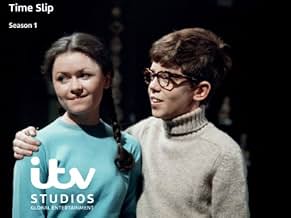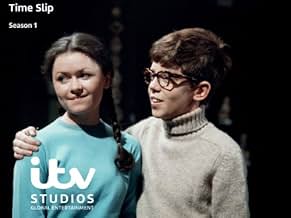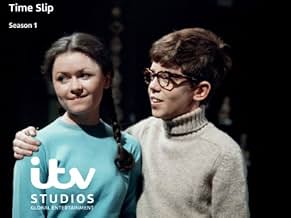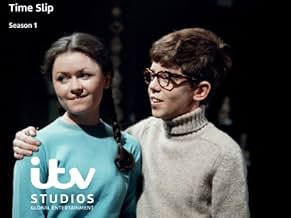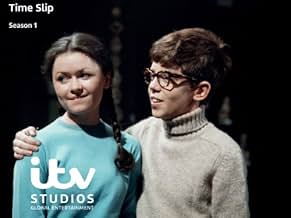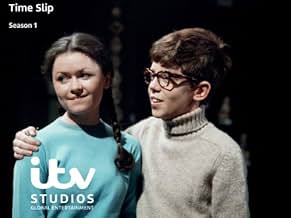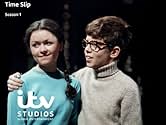Simon and Liz fell into a time hole and found themselves trapped in different eras of the 20th century, where they have all sorts of adventures. Many of these involve the nefarious Commander... Read allSimon and Liz fell into a time hole and found themselves trapped in different eras of the 20th century, where they have all sorts of adventures. Many of these involve the nefarious Commander Traynor, who is also traveling through time.Simon and Liz fell into a time hole and found themselves trapped in different eras of the 20th century, where they have all sorts of adventures. Many of these involve the nefarious Commander Traynor, who is also traveling through time.
Browse episodes
Featured reviews
Simon Randall (Spencer Banks) and Liz Skinner (Cheryl Burfield) are teenage friends who slipped into a time hole to find themselves trapped in various periods of the 20th century, where they encounter all sorts of strange environments.
Another traveler, Commander Charles Traynor (Denis Quilley) also played Caliban in "The Tempest" with John Gielgud
They are not always alone and are also connected telepathically. Similar to projects like "The Time Tunnel" (1966), but has more of that ancient British TV such as the first shows of "Doctor Who" (1963) with William Hartnell.
This program is broken into many small parts which can be annoying and must have been annoying if you had to wait between the parts on the original presentation. Now we have the opportunity to binge 26 episodes. No fare looking ahead as it does wrap up well.
Another traveler, Commander Charles Traynor (Denis Quilley) also played Caliban in "The Tempest" with John Gielgud
They are not always alone and are also connected telepathically. Similar to projects like "The Time Tunnel" (1966), but has more of that ancient British TV such as the first shows of "Doctor Who" (1963) with William Hartnell.
This program is broken into many small parts which can be annoying and must have been annoying if you had to wait between the parts on the original presentation. Now we have the opportunity to binge 26 episodes. No fare looking ahead as it does wrap up well.
Timeslip is one of many science fiction series from the 1970's. However, crucially it is also one of the best, standing the test of time better than say the excruciatingly cheap but entertaining romp that was the Tomorrow People or the imaginative fantasy series The Ace of Wands. Created by Ruth Boswell and husband James Boswell, the series focused on crucial issues in an increasingly technological age and did so all under the banner of a serious children's television drama, which for its time was really quite something. Aimed as a rival to the BBC's Doctor Who, the Boswell's and excellent television writer Bruce Stewart produced something entirely different from what was available on British television at the time. Doomwatch - the gritty and often rather lacklustre series covering moral, social and environmental issues was the only programme that came close to Timeslip at this time, but Timeslip was overall much more successful. The premise of the story - a young girl finding a time barrier at an abandoned naval station - is truly intriguing, add in some atmospheric direction from a team of excellent directors, sparse but brilliantly executed location footage and some solid performances - special note goes to the flawless and concentrated performance of Denis Quilley as Commander Traynor and you have a remarkably entertaining and memorable series. The regulars, intrigued by local gossip about the young girl and drawn to the time barrier were an excellent choice as central characters - as children from 1970 could instantly relate to them. Simon, portrayed by the excellent child actor Spencer Banks is the brainy one, interested in science and maths, with an instinct for discovery he single-handedly figures out all the crucial plot points for the audience to absorb, whilst (rather unfortunately) the naive and whining Liz, played by the admirable Cheryl Burfield, whines a little longer. In this respect the serial has dated - but the concepts and ideas put forward, and its ability to predict many future issues put the series way ahead of its time. Timeslip is quite simply 26 episodes of virtually flawless television. Throw away the minor grumbles about the sexist interpretation of Liz and the opening stories slightly laboured execution and delve in. The Wrong End of Time is a fantastic instalment in which one of our central protagonists encounters her father in a 1940's naval station - coincidentally where the time barrier stands in 1970's England - and with the first appearance of Commander Traynor - a character so crucial to the overall story. The Time of the Ice Box gives viewers a terrible insight into future earth - and Liz's alter ego Beth. One of the strongest stories of all - The Year of the Burn Up gives us an equally bleak presentation of future earth - Buckinghamshire turned into an Amazonian jungle, with the issue of climate change being brought to the fore - and all this occurring as a possible projection (like the Ice Box) of the Earth in 1990. The final story - written by the excellent Victor Pemberton - effortlessly following on from Bruce Stewart - addresses the importance of individuality and the limits of genetic progress - with another appearance of the excellent John Barron as Devereaux and a marvellous final twist concerning the malevolent and untrustworthy Commander Traynor. And so after 26 episodes, the series ended. Could it have ran for another series? ........ Quite possibly - but what we have is truly special, consistently brilliant, consistently thought provoking and remarkably well made for its small budget, skillfully avoiding ambitious special effects and concentrating on character, mood and atmosphere. Timeslip is a slice of television gold - one of the best TV series of its time. So sit back relax, and watch the excellent DVD set of all 26 episodes. Beware though, you might want to adjust your lenses for episode 12! To repeat a hideous, but fitting cliché - they don't make them like this anymore!!!
There are four TimeSlip video sets, long out of pring, and the series is currently on DVD with a colour episode (how careless that the original colour tapes have been wiped).
The special effects are quite primitive - but it's the ideas that strike a chord when you watch the stories today. The second and third stories are set in the "future" - of 1970, which is now our past. 1990 must have seemed the distant future back then - long enough for many changes to have happened.
We see ideas that do concern us today - cloning, putting faith in computers, virtual reality, and global warming. Perhaps some borrowed elements, e.g. from The Prisoner - the boy as an adult has just a number in the third story.
It should be said that the series is not by any means perfect. It is slow in places, the acting sometimes is a bit creaky, and Liz and Simon's parents don't seem to quite be old enough when another 20 years is added on. The 1970 visualisation of a 1990 computer was always unlikely to be correctly guessed, after all pocket calculators were a few years off, and home computers in any form were easily eight years away.
The first story, set in World War II, has some genuinely inspired moments, and the story as a whole is never completely finished - I think there was always a possibility of them coming back for a fifth series.
The special effects are quite primitive - but it's the ideas that strike a chord when you watch the stories today. The second and third stories are set in the "future" - of 1970, which is now our past. 1990 must have seemed the distant future back then - long enough for many changes to have happened.
We see ideas that do concern us today - cloning, putting faith in computers, virtual reality, and global warming. Perhaps some borrowed elements, e.g. from The Prisoner - the boy as an adult has just a number in the third story.
It should be said that the series is not by any means perfect. It is slow in places, the acting sometimes is a bit creaky, and Liz and Simon's parents don't seem to quite be old enough when another 20 years is added on. The 1970 visualisation of a 1990 computer was always unlikely to be correctly guessed, after all pocket calculators were a few years off, and home computers in any form were easily eight years away.
The first story, set in World War II, has some genuinely inspired moments, and the story as a whole is never completely finished - I think there was always a possibility of them coming back for a fifth series.
An absolutely marvellous show, and certainly not just for kids. It details the adventures of Liz and Simon, two teenage children who discover that they can pass through an invisible time barrier into past and future ages. Along the way they are involved in remarkable events, illustrating all sorts of scientific issues, and even meet past and future versions of themselves and their families.
On the surface, it had a lot of things going against it - low budget, primitive special effects and (as a result of technical problems) transmitted in black and white. These factors have probably killed its chances of being re-broadcast but its video release in 1993 allowed a new generation to appreciate it and see how it easily transcended the low production values.
Why is it so good? The biggest factor is utterly superb writing. Throughout stories were written with tremendous care, ensuring continuity. The viewer is always eager for more. The scientific themes covered such as time travel, global warming, the dangers of technology, cloning and unsafe drug experimentation are done with great accuracy - unlike a lot of science fiction - but never become dull or pontificating. The show also explores issues of authority, ambition, surveillance, elitism, betrayal and ethics - no sugar-coated kids' entertainment. Thirty years after the show was made these issues are even more relevant.
However the best quality of the writing is the dialogue, which is often tremendously funny but never risks tipping the show into comedy or making light of the drama involved. The humour is that of ordinary interaction and relationships. One reason why this is possible is the real depth of the characterisations.
Over 26 episodes there is a real opportunity to flesh out the characters. Simon is a rather geeky, bespectacled young man, obsessed with science but aware of its proper uses, and never quite sure how to deal with Liz. Liz is truly unpredictable, emotional, sometimes careless but quite feisty. She also doesn't quite know what she feels about Simon. A possible future is revealed in one story where they meet their future selves and it transpires that they were once engaged before being found to be "incompatible" by a computer test. Their future guises are tremendously entertaining - especially Liz who in one story is a cold-hearted authoritarian scientist and in another a remarkably warm, positive and charming leader of a group of outcast children.
The other characters are very well-drawn. Liz's father, Frank, is aggressive and impulsive. Her mother, Jean, is protective but much more astute. More significant is the enigmatic and often sinister figure of Commander Trainor, a government scientist who is all too eager to manipulate Liz and Simon and about whom we discover some disturbing secrets. Morgan C. Devereaux features in two stories as a brilliant but utterly unprincipled scientist who risks mayhem on those around him in his pursuit of "progress". Each story also has a range of fine ancillary characters - none better than the disturbing clones seen in "The Year Of the Burn-Up" who no have the edge on their human creators due to their devotion to "service" and "authority". Their intrigues against their supposed masters are marvellous viewing.
All the main cast give skilled acting displays - Cheryl Burfield as Liz, Spencer Banks (Simon), Derek Benfield (Frank)and Iris Russell (Jean). Particularly noteworthy are the displays of Denis Quilley as Trainor, John Barron as the odd Devereaux, Mary Preston as the future forms of Liz and David Graham as the future Simon. However it is hard to find fault with any of the guest cast as well.
The show is interesting in other ways. Liz dresses and sometimes acts well below her teenage years, even calling her parents "Mummy" and "Daddy" and wearing pig-tails. Characters regularly use the word "queer" when they mean "strange". The visions of the world in 1990 are rather more apocalyptic and much more scientifically advanced than actually happened, but the risks they point to are still present.
Anybody with an interest in thought-provoking, intelligent but witty entertainment would appreciate this show. A bit of hunting in the second-hand video stores may be the prelude to a lot of satisfied viewing...
On the surface, it had a lot of things going against it - low budget, primitive special effects and (as a result of technical problems) transmitted in black and white. These factors have probably killed its chances of being re-broadcast but its video release in 1993 allowed a new generation to appreciate it and see how it easily transcended the low production values.
Why is it so good? The biggest factor is utterly superb writing. Throughout stories were written with tremendous care, ensuring continuity. The viewer is always eager for more. The scientific themes covered such as time travel, global warming, the dangers of technology, cloning and unsafe drug experimentation are done with great accuracy - unlike a lot of science fiction - but never become dull or pontificating. The show also explores issues of authority, ambition, surveillance, elitism, betrayal and ethics - no sugar-coated kids' entertainment. Thirty years after the show was made these issues are even more relevant.
However the best quality of the writing is the dialogue, which is often tremendously funny but never risks tipping the show into comedy or making light of the drama involved. The humour is that of ordinary interaction and relationships. One reason why this is possible is the real depth of the characterisations.
Over 26 episodes there is a real opportunity to flesh out the characters. Simon is a rather geeky, bespectacled young man, obsessed with science but aware of its proper uses, and never quite sure how to deal with Liz. Liz is truly unpredictable, emotional, sometimes careless but quite feisty. She also doesn't quite know what she feels about Simon. A possible future is revealed in one story where they meet their future selves and it transpires that they were once engaged before being found to be "incompatible" by a computer test. Their future guises are tremendously entertaining - especially Liz who in one story is a cold-hearted authoritarian scientist and in another a remarkably warm, positive and charming leader of a group of outcast children.
The other characters are very well-drawn. Liz's father, Frank, is aggressive and impulsive. Her mother, Jean, is protective but much more astute. More significant is the enigmatic and often sinister figure of Commander Trainor, a government scientist who is all too eager to manipulate Liz and Simon and about whom we discover some disturbing secrets. Morgan C. Devereaux features in two stories as a brilliant but utterly unprincipled scientist who risks mayhem on those around him in his pursuit of "progress". Each story also has a range of fine ancillary characters - none better than the disturbing clones seen in "The Year Of the Burn-Up" who no have the edge on their human creators due to their devotion to "service" and "authority". Their intrigues against their supposed masters are marvellous viewing.
All the main cast give skilled acting displays - Cheryl Burfield as Liz, Spencer Banks (Simon), Derek Benfield (Frank)and Iris Russell (Jean). Particularly noteworthy are the displays of Denis Quilley as Trainor, John Barron as the odd Devereaux, Mary Preston as the future forms of Liz and David Graham as the future Simon. However it is hard to find fault with any of the guest cast as well.
The show is interesting in other ways. Liz dresses and sometimes acts well below her teenage years, even calling her parents "Mummy" and "Daddy" and wearing pig-tails. Characters regularly use the word "queer" when they mean "strange". The visions of the world in 1990 are rather more apocalyptic and much more scientifically advanced than actually happened, but the risks they point to are still present.
Anybody with an interest in thought-provoking, intelligent but witty entertainment would appreciate this show. A bit of hunting in the second-hand video stores may be the prelude to a lot of satisfied viewing...
I was six when Timeslip was shown, but it has really stayed with me. I am surprised that no-one has published anything about it on the WWW, and yes, I have indeed been sad enough to search for it. Hell, there is even a Double Deckers page, so why not Timeslip!
Some things I remember are:
*some episodes were in colour, and others in black and white. Might this be why it has not been reshown?
*that the scary blary ATV sig tune blended perfectly into the theme music: da-da-da-da-DAAAAAA.....
*the way Liz and Simon would feel along the gap in the wire netting to find the Time Barrier.
*thinking how freaky it was when Liz met herself in the future (probably 1988 or something), but that she was called Beth.
*I used to have the novelisation, and there was also the comic strip version in Look-in (someone needs to do a Look-In website, by the way).
Does anyone know if Timeslip is available on video? I have never found it and would love to see it again.
Some things I remember are:
*some episodes were in colour, and others in black and white. Might this be why it has not been reshown?
*that the scary blary ATV sig tune blended perfectly into the theme music: da-da-da-da-DAAAAAA.....
*the way Liz and Simon would feel along the gap in the wire netting to find the Time Barrier.
*thinking how freaky it was when Liz met herself in the future (probably 1988 or something), but that she was called Beth.
*I used to have the novelisation, and there was also the comic strip version in Look-in (someone needs to do a Look-In website, by the way).
Does anyone know if Timeslip is available on video? I have never found it and would love to see it again.
Did you know
- TriviaThe regular cast were very close: Spencer Banks and Cheryl Burfield are still friends (her husband was best man at his wedding), and godparents to each other's children.
- ConnectionsFeatured in WatchMojo: Top 10 Time Travel TV Shows (2016)
- How many seasons does Timeslip have?Powered by Alexa
Details
Contribute to this page
Suggest an edit or add missing content








